Unit 2 Topic 1 You should brush your teeth twice a day.Section D 课件 八年级英语上册(仁爱版)(共30张PPT)
文档属性
| 名称 | Unit 2 Topic 1 You should brush your teeth twice a day.Section D 课件 八年级英语上册(仁爱版)(共30张PPT) | 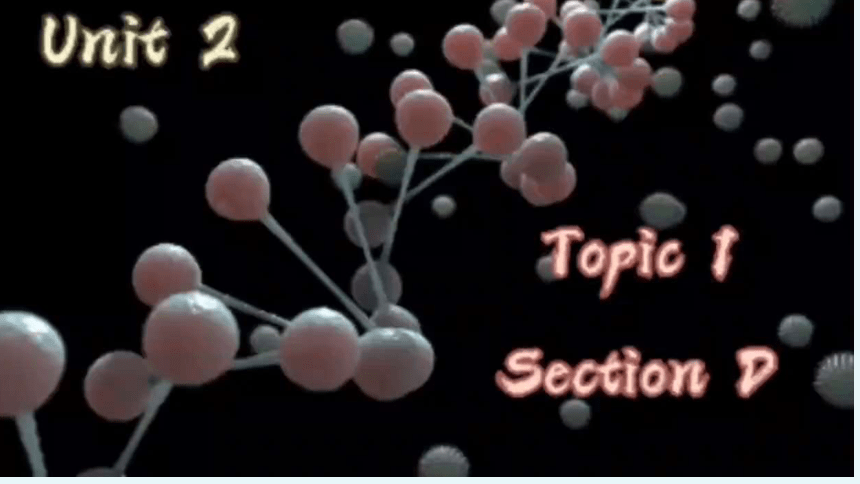 | |
| 格式 | pptx | ||
| 文件大小 | 17.2MB | ||
| 资源类型 | 教案 | ||
| 版本资源 | 仁爱科普版 | ||
| 科目 | 英语 | ||
| 更新时间 | 2023-09-18 14:32:44 | ||
图片预览

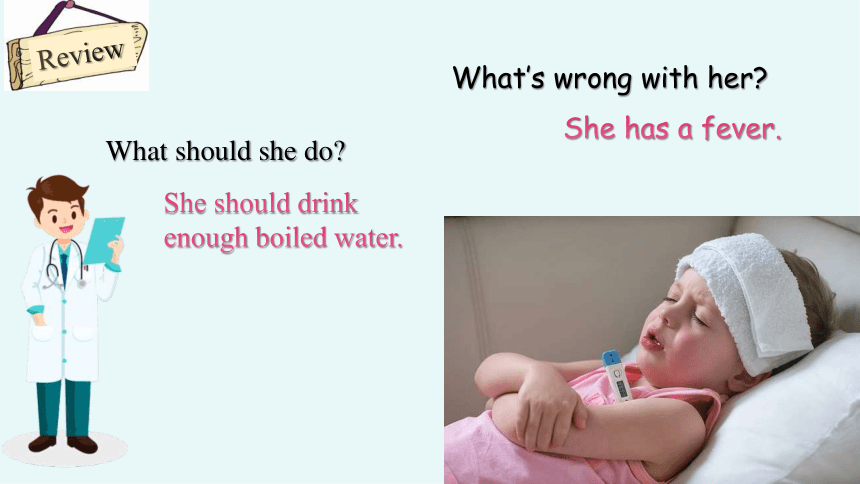
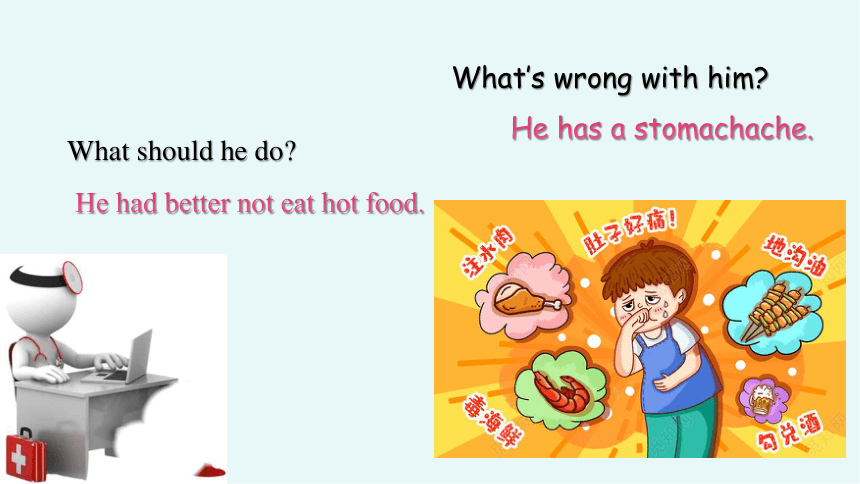
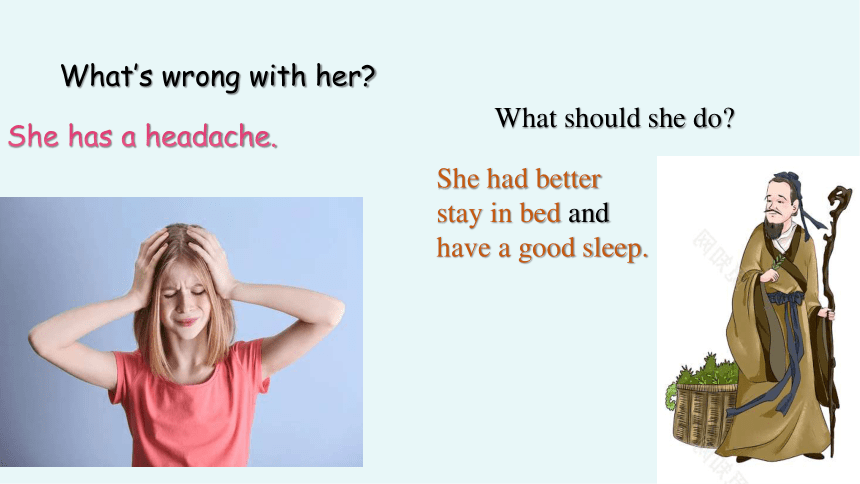
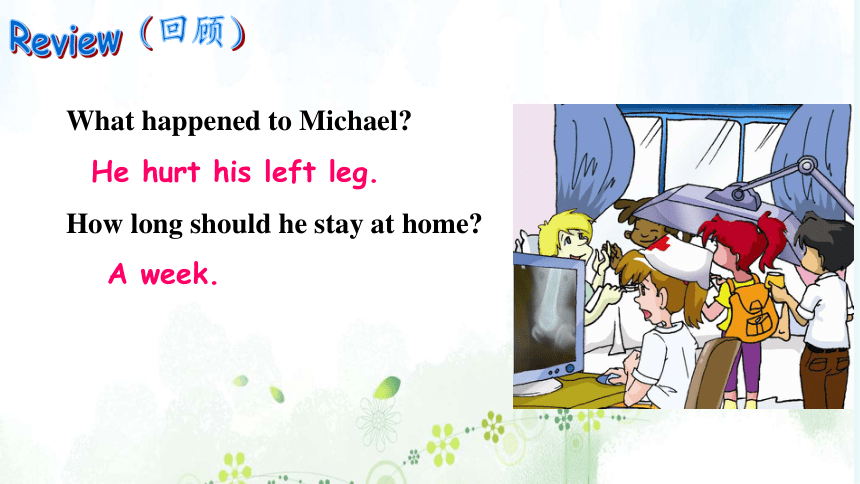

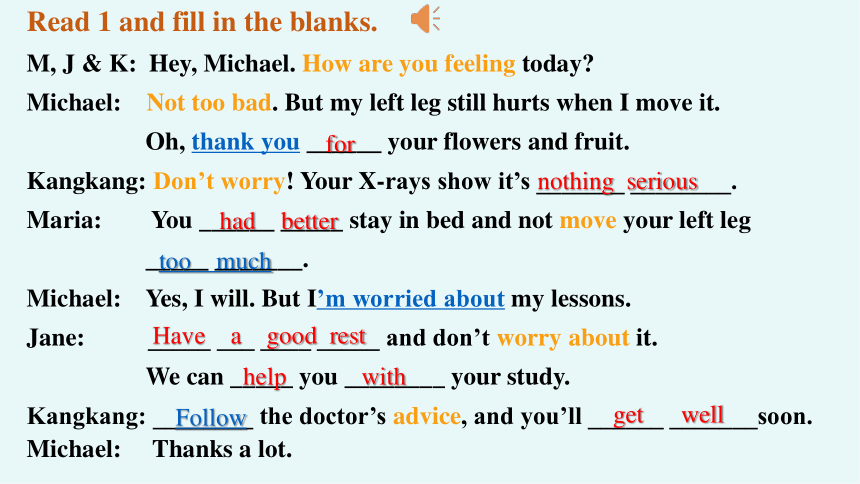
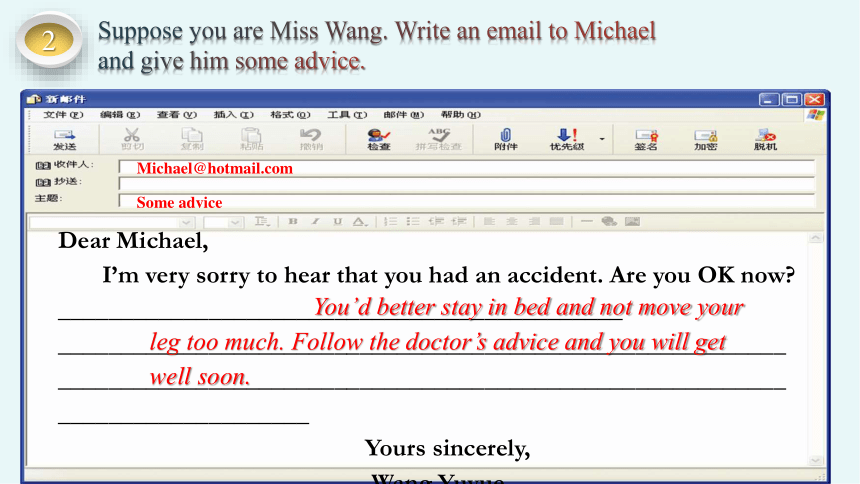
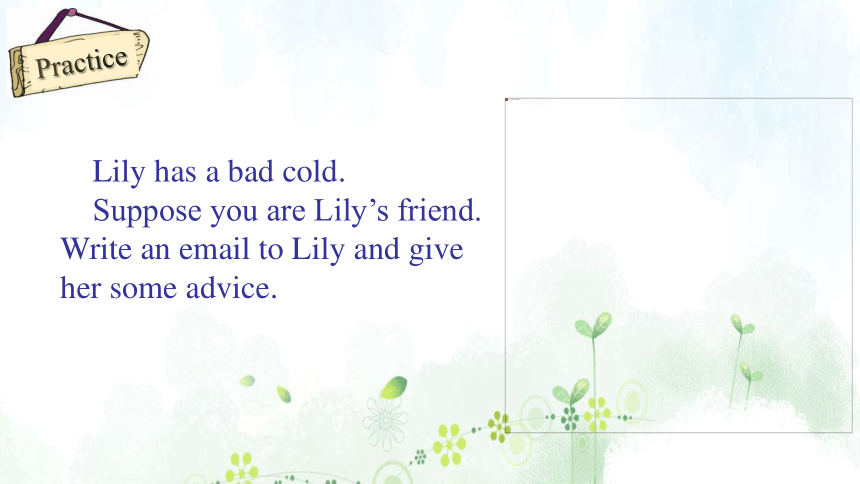

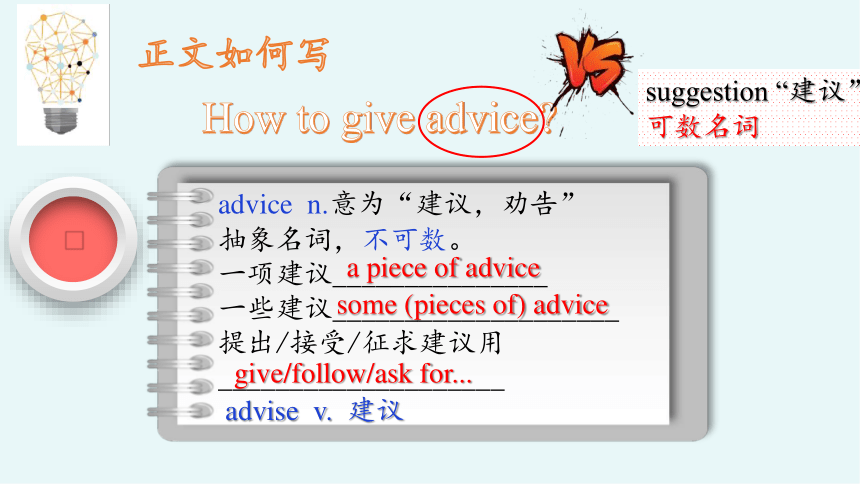
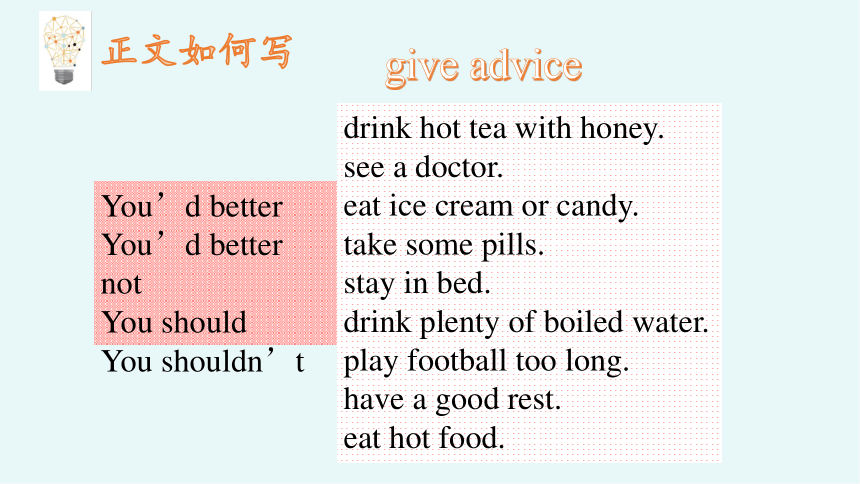
文档简介
(共30张PPT)
Review
What’s wrong with her
She has a fever.
What should she do
She should drink enough boiled water.
What’s wrong with him
He has a stomachache.
What should he do
He had better not eat hot food.
What’s wrong with her
She has a headache.
What should she do
She had better
stay in bed and have a good sleep.
What happened to Michael
How long should he stay at home
He hurt his left leg.
A week.
Review(回顾)
1
Maria, Jane and Kangkang come to visit Michael at his home.
Listen to 1a and mark T(True) or F(False).
Michael’s right leg still hurts when he moves it. ( )
Michael’s friends brought some food and fruit for him. ( )
Kangkang asked Michael not to move his leg too much. ( )
Michael had better stay in bed and have a rest. ( )
Michael’s friends will help him with his lessons. ( )
F
F
F
T
T
bring sb. sth.=bring sth. for sb.为某人带某物
ask sb. not to do sth. 要求某人不要做某事
help sb. with sth. /help sb. (to) do sth.
帮助某人做某事
Read 1 and fill in the blanks.
M, J & K: Hey, Michael. How are you feeling today
Michael: Not too bad. But my left leg still hurts when I move it.
Oh, thank you ______ your flowers and fruit.
Kangkang: Don’t worry! Your X-rays show it’s _______ ________.
Maria: You ______ _____ stay in bed and not move your left leg
_____ _______.
Michael: Yes, I will. But I’m worried about my lessons.
Jane: _____ ___ ____ _____ and don’t worry about it.
We can _____ you ________ your study.
Kangkang: ________ the doctor’s advice, and you’ll ______ _______soon.
Michael: Thanks a lot.
for
nothing serious
had better
too much
Have a good rest
help with
Follow
get well
2
Suppose you are Miss Wang. Write an email to Michael and give him some advice.
Michael@
Some advice
Dear Michael,
I’m very sorry to hear that you had an accident. Are you OK now _____________________________________________
________________________________________________________________________________________________________________________________________
Yours sincerely,
Wang Yuyue
You’d better stay in bed and not move your leg too much. Follow the doctor’s advice and you will get well soon.
Practice
Lily has a bad cold.
Suppose you are Lily’s friend.
Write an email to Lily and give her some advice.
开头的称呼
注意礼貌性
Dear Sir.
Dear madam.
Dear Michael
邮件的第一句
表明写邮件的意图
邮件的最后一句
表明希望收到回信或者祝愿
落款
右下角
Yours sincerely.
ⅩⅩⅩ
How to write an email
正文如何写
How to give advice
advice n.意为“建议,劝告”
抽象名词,不可数。
一项建议_______________
一些建议____________________
提出/接受/征求建议用
____________________
advise v. 建议
a piece of advice
some (pieces of) advice
give/follow/ask for...
suggestion “建议”可数名词
give advice
正文如何写
You’d better
You’d better not
You should
You shouldn’t
drink hot tea with honey.
see a doctor.
eat ice cream or candy.
take some pills.
stay in bed.
drink plenty of boiled water.
play football too long.
have a good rest.
eat hot food.
Dear Lily,
I am sorry to hear that you has a bad cold. Are you OK now You should ______________________________________________________
___________________________________________________________________________________________________________________________________________________________
Yours, Jennifer
Lily@renai-
Some advice
Project
1. Write down the names of different kinds of
illnesses on cards and mix them up.
Choosing Dr. Best
2. One student chooses one of the cards and
acts as the “patient”. The other students
guess what’s wrong with him or her.
3. The one who gets the correct answer first will be
the “doctor”. Then the “doctor” gives the “patient”
some advice.
4. Play the game several times and choose the
“Dr. Best” of your class.
Project
Choosing Dr. Best
Read through Sections A-C and fill in the blanks with the correct words.
Grammar
You ________________ see a dentist.
You ___________________ drink coffee or tea in the evening.
You ________________ take some medicine.
You _____________________ go to school today.
Modal Verbs (Ⅰ): should/shouldn’t; had better/had better not
should/had better
shouldn’t/had better not
should/had better
shouldn’t/had better not
询问对方的病情和其他不适情况,常用表达:
① What‘s wrong with ...
② What‘s the trouble with ...
③ What‘s the matter with ...
④ Is there anything wrong with...
⑤ What's up (更多用于口语)
用来提建议的常用表达:
① You should/shouldn't do ....
② You had better/had better not do....
③ Why don't you +动词原形...
④ Why not+动词原形...
⑤ What about/How about doing sth...
Functions
You don’t look _________ .
I _______ a toothache/a cold / a cough / a backache / a fever / the flu / a stomachache / a headache.
I am sorry to _____ that. I’m ________ terrible!
___________ have you been like this _____ are you feeling, Nick
______ two pills, three times a day.
hear
have
feeling
How long
How
Take
well
Language Points
1. Oh, thank you for your flowers and fruit.
考点: ①fruit n. 意为“水果”,通常为不可数名词。
但当作水果的种类是可用fruits,表示各种水果。
(链接:food的用法跟它类似)
eg. (1) I like to eat apples, pears and other fruits.
(2)想吃点水果吗?
__________________________________
②thank you for+名词/代词/动名词,意为“因......而感谢你”。
eg. 谢谢你的帮助。/谢谢你帮助我。
___________________________________________
Thank you for your help./ Thank you for helping me.
Would you like some fruit
back
Language Points
2. You had better stay in bed and not move your left leg too much.
考点:too much ①用来修饰不可数名词 意为“太多”。
②用来修饰动词,放在动词后。
eg.
too much noise
Don't talk too much.
back
Language Points
3. But I’m worried about my lessons.
考点: ①worry v. 意为“发愁,担心,烦恼”
常与介词about连用, 意为“为...担心”
eg. 不用担心这个男孩,他很快就会回来。
____________________________________________
②worried adj. 担心的 常与be, look, feel等系动词连用。
eg. 玛利亚为她的孩子们担心。
___________________________________________
Maria is worried about her children.
Don't worry about the boy. He'll be back soon.
back
Language Points
4. Follow the doctor’s advice, and you’ll get well soon.
考点:follow ①表示“跟随”,用作及物或不及物动词。
eg. 冬去春来________________________
我不论到哪里,这狗都跟着。
____________________________________
②表示“听从,遵循”
eg. 你能听懂我的话吗?_______________________
我们应该遵守交通规则。
____________________________________
Do/Can you follow me
Spring follows winter.
The dog follows me wherever I go.
We should follow the traffic rules.
back
Exercises
1. You should ________ (take) some cold pills. You’ll be better soon.
2. You’d better ________ (not be) late for school next time, Jim.
3. Take care of your ________ (tooth), or you’ll have a toothache.
4. Thank you for ________ (give) me your advice.
5. Li Tao’s mother asked him ____________ (not work)
on the computer too long.
take
用所给词的适当形式填空。
not be
teeth
giving
not to work
Exercises
6. The boy never _______ (brush) his shoes.
7. Can you give me some _____________ (suggest)
8. Follow the dentist’s _______ (advise), and you’ll get well soon.
9. Take care of your _______(tooth), or you’ll have a toothache.
10. You have a fever, you’d better _______ (lie) down
and have a rest.
brushes
用所给词的适当形式填空。
suggestions
advice
teeth
lie
Exercises
1. — What’s the matter with you
— _____.
A. I’ll have a good rest. B. Let me check it over.
C. My head hurts D. I’m feeling better.
2. Both Lily and I _____ ill. We should go to see Dr. Brown at once.
A. is B. am C. are D. have
3. Tony’s mother was ill last week, so he asked for _____ leave to
look after her.
A. three days B. three day C. three days’ D. three day
4. — Be careful when you are on the way to school.
— _______. I can look after myself well.
A. Not worry me. B. Not worry.
C. Don’t worry about. D. Don’t worry about me.
C
C
C
check sb.over
给某人做检查
D
= take good care of myself.
1. 这个生病的女孩非常担心她的功课。
The sick girl _________ _______ her lesson.
2. —你今天感觉怎么样?
—不是很糟。
—How are you feeling today
—_______ _______.
3. 我不在的时候你要照顾好你自己。
You must _______ _______ _______ yourself without me.
4. 把这药吃了,每天三次。
_______ the _________, three times a day.
5. 不要看电视看得时间太长了。
Don’t watch TV _______ _______.
Exercises
worries about
Not bad
/Not too bad
take care of
Take/Have medicine
too long
Sum up
1.too much ; too many
2.Follow the doctor’s advice, and you’ll get well soon.
3.But I’m worried about my lessons. (worry;worried)
4.用来提建议的常用表达:
①You should/shouldn't do ....
②You had better/had better not do....
③Why don't you +动词原形...
④ Why not+动词原形...
⑤ What about/How about doing sth...
Homework
1. Read 1
2. Review the key points of Section A - Section D.
3. Finish Section D in your workbook.
4. Preview Section A in next topic.
Review
What’s wrong with her
She has a fever.
What should she do
She should drink enough boiled water.
What’s wrong with him
He has a stomachache.
What should he do
He had better not eat hot food.
What’s wrong with her
She has a headache.
What should she do
She had better
stay in bed and have a good sleep.
What happened to Michael
How long should he stay at home
He hurt his left leg.
A week.
Review(回顾)
1
Maria, Jane and Kangkang come to visit Michael at his home.
Listen to 1a and mark T(True) or F(False).
Michael’s right leg still hurts when he moves it. ( )
Michael’s friends brought some food and fruit for him. ( )
Kangkang asked Michael not to move his leg too much. ( )
Michael had better stay in bed and have a rest. ( )
Michael’s friends will help him with his lessons. ( )
F
F
F
T
T
bring sb. sth.=bring sth. for sb.为某人带某物
ask sb. not to do sth. 要求某人不要做某事
help sb. with sth. /help sb. (to) do sth.
帮助某人做某事
Read 1 and fill in the blanks.
M, J & K: Hey, Michael. How are you feeling today
Michael: Not too bad. But my left leg still hurts when I move it.
Oh, thank you ______ your flowers and fruit.
Kangkang: Don’t worry! Your X-rays show it’s _______ ________.
Maria: You ______ _____ stay in bed and not move your left leg
_____ _______.
Michael: Yes, I will. But I’m worried about my lessons.
Jane: _____ ___ ____ _____ and don’t worry about it.
We can _____ you ________ your study.
Kangkang: ________ the doctor’s advice, and you’ll ______ _______soon.
Michael: Thanks a lot.
for
nothing serious
had better
too much
Have a good rest
help with
Follow
get well
2
Suppose you are Miss Wang. Write an email to Michael and give him some advice.
Michael@
Some advice
Dear Michael,
I’m very sorry to hear that you had an accident. Are you OK now _____________________________________________
________________________________________________________________________________________________________________________________________
Yours sincerely,
Wang Yuyue
You’d better stay in bed and not move your leg too much. Follow the doctor’s advice and you will get well soon.
Practice
Lily has a bad cold.
Suppose you are Lily’s friend.
Write an email to Lily and give her some advice.
开头的称呼
注意礼貌性
Dear Sir.
Dear madam.
Dear Michael
邮件的第一句
表明写邮件的意图
邮件的最后一句
表明希望收到回信或者祝愿
落款
右下角
Yours sincerely.
ⅩⅩⅩ
How to write an email
正文如何写
How to give advice
advice n.意为“建议,劝告”
抽象名词,不可数。
一项建议_______________
一些建议____________________
提出/接受/征求建议用
____________________
advise v. 建议
a piece of advice
some (pieces of) advice
give/follow/ask for...
suggestion “建议”可数名词
give advice
正文如何写
You’d better
You’d better not
You should
You shouldn’t
drink hot tea with honey.
see a doctor.
eat ice cream or candy.
take some pills.
stay in bed.
drink plenty of boiled water.
play football too long.
have a good rest.
eat hot food.
Dear Lily,
I am sorry to hear that you has a bad cold. Are you OK now You should ______________________________________________________
___________________________________________________________________________________________________________________________________________________________
Yours, Jennifer
Lily@renai-
Some advice
Project
1. Write down the names of different kinds of
illnesses on cards and mix them up.
Choosing Dr. Best
2. One student chooses one of the cards and
acts as the “patient”. The other students
guess what’s wrong with him or her.
3. The one who gets the correct answer first will be
the “doctor”. Then the “doctor” gives the “patient”
some advice.
4. Play the game several times and choose the
“Dr. Best” of your class.
Project
Choosing Dr. Best
Read through Sections A-C and fill in the blanks with the correct words.
Grammar
You ________________ see a dentist.
You ___________________ drink coffee or tea in the evening.
You ________________ take some medicine.
You _____________________ go to school today.
Modal Verbs (Ⅰ): should/shouldn’t; had better/had better not
should/had better
shouldn’t/had better not
should/had better
shouldn’t/had better not
询问对方的病情和其他不适情况,常用表达:
① What‘s wrong with ...
② What‘s the trouble with ...
③ What‘s the matter with ...
④ Is there anything wrong with...
⑤ What's up (更多用于口语)
用来提建议的常用表达:
① You should/shouldn't do ....
② You had better/had better not do....
③ Why don't you +动词原形...
④ Why not+动词原形...
⑤ What about/How about doing sth...
Functions
You don’t look _________ .
I _______ a toothache/a cold / a cough / a backache / a fever / the flu / a stomachache / a headache.
I am sorry to _____ that. I’m ________ terrible!
___________ have you been like this _____ are you feeling, Nick
______ two pills, three times a day.
hear
have
feeling
How long
How
Take
well
Language Points
1. Oh, thank you for your flowers and fruit.
考点: ①fruit n. 意为“水果”,通常为不可数名词。
但当作水果的种类是可用fruits,表示各种水果。
(链接:food的用法跟它类似)
eg. (1) I like to eat apples, pears and other fruits.
(2)想吃点水果吗?
__________________________________
②thank you for+名词/代词/动名词,意为“因......而感谢你”。
eg. 谢谢你的帮助。/谢谢你帮助我。
___________________________________________
Thank you for your help./ Thank you for helping me.
Would you like some fruit
back
Language Points
2. You had better stay in bed and not move your left leg too much.
考点:too much ①用来修饰不可数名词 意为“太多”。
②用来修饰动词,放在动词后。
eg.
too much noise
Don't talk too much.
back
Language Points
3. But I’m worried about my lessons.
考点: ①worry v. 意为“发愁,担心,烦恼”
常与介词about连用, 意为“为...担心”
eg. 不用担心这个男孩,他很快就会回来。
____________________________________________
②worried adj. 担心的 常与be, look, feel等系动词连用。
eg. 玛利亚为她的孩子们担心。
___________________________________________
Maria is worried about her children.
Don't worry about the boy. He'll be back soon.
back
Language Points
4. Follow the doctor’s advice, and you’ll get well soon.
考点:follow ①表示“跟随”,用作及物或不及物动词。
eg. 冬去春来________________________
我不论到哪里,这狗都跟着。
____________________________________
②表示“听从,遵循”
eg. 你能听懂我的话吗?_______________________
我们应该遵守交通规则。
____________________________________
Do/Can you follow me
Spring follows winter.
The dog follows me wherever I go.
We should follow the traffic rules.
back
Exercises
1. You should ________ (take) some cold pills. You’ll be better soon.
2. You’d better ________ (not be) late for school next time, Jim.
3. Take care of your ________ (tooth), or you’ll have a toothache.
4. Thank you for ________ (give) me your advice.
5. Li Tao’s mother asked him ____________ (not work)
on the computer too long.
take
用所给词的适当形式填空。
not be
teeth
giving
not to work
Exercises
6. The boy never _______ (brush) his shoes.
7. Can you give me some _____________ (suggest)
8. Follow the dentist’s _______ (advise), and you’ll get well soon.
9. Take care of your _______(tooth), or you’ll have a toothache.
10. You have a fever, you’d better _______ (lie) down
and have a rest.
brushes
用所给词的适当形式填空。
suggestions
advice
teeth
lie
Exercises
1. — What’s the matter with you
— _____.
A. I’ll have a good rest. B. Let me check it over.
C. My head hurts D. I’m feeling better.
2. Both Lily and I _____ ill. We should go to see Dr. Brown at once.
A. is B. am C. are D. have
3. Tony’s mother was ill last week, so he asked for _____ leave to
look after her.
A. three days B. three day C. three days’ D. three day
4. — Be careful when you are on the way to school.
— _______. I can look after myself well.
A. Not worry me. B. Not worry.
C. Don’t worry about. D. Don’t worry about me.
C
C
C
check sb.over
给某人做检查
D
= take good care of myself.
1. 这个生病的女孩非常担心她的功课。
The sick girl _________ _______ her lesson.
2. —你今天感觉怎么样?
—不是很糟。
—How are you feeling today
—_______ _______.
3. 我不在的时候你要照顾好你自己。
You must _______ _______ _______ yourself without me.
4. 把这药吃了,每天三次。
_______ the _________, three times a day.
5. 不要看电视看得时间太长了。
Don’t watch TV _______ _______.
Exercises
worries about
Not bad
/Not too bad
take care of
Take/Have medicine
too long
Sum up
1.too much ; too many
2.Follow the doctor’s advice, and you’ll get well soon.
3.But I’m worried about my lessons. (worry;worried)
4.用来提建议的常用表达:
①You should/shouldn't do ....
②You had better/had better not do....
③Why don't you +动词原形...
④ Why not+动词原形...
⑤ What about/How about doing sth...
Homework
1. Read 1
2. Review the key points of Section A - Section D.
3. Finish Section D in your workbook.
4. Preview Section A in next topic.
同课章节目录
- Unit 1 Playing Sports
- Topic 1 I'm going to play basketball.
- Topic 2 I'll kick you the ball again.
- Topic 3 The school sports meet is coming.
- Unit 2 Keeping Healthy
- Topic 1 You should brush your teeth twice a day.
- Topic 2 I must ask him to give up smoking.
- Topic 3 Must we exercise to prevent the flu?
- Unit 3 Our Hobbies
- Topic 1 What's your hobby?
- Topic 2 What sweet music!
- Topic 3 What were you doing at this time yesterday
- Unit 4 Our World
- Topic 1 What's the strongest animal on the farm?
- Topic 2 How can we protect ourselves from the eart
- Topic 3 The Internet makes the world smaller.
